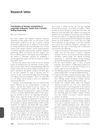Management of Congenital Ichthyoses: European Guidelines of Care, Part Two
June 2018
in “
British Journal of Dermatology
”

TLDR European guidelines recommend regular eye and ear exams, skin care, vitamin D supplements, and cautious use of medications for managing congenital ichthyoses.
The document outlines European guidelines for managing congenital ichthyoses (CI), a group of genetic skin disorders. It provides recommendations for various complications associated with CI, such as ophthalmic and ear issues, pruritus, pain, infections, growth and nutritional deficiencies, hair and nail problems, and physical limitations. Specific advice includes regular ophthalmic exams, use of ocular lubricants, hearing evaluations, topical skin care, and oral retinoids for pruritus, as well as monitoring and supplementing vitamin D levels. The guidelines also address the management of CI in neonates, including the care of collodion babies and harlequin ichthyosis, with an emphasis on avoiding certain topical substances and considering oral retinoids for severe cases. For Netherton syndrome, the document suggests limited use of topical steroids and calcineurin inhibitors, cautious phototherapy, and regular dermatological check-ups for skin cancer risks. The recommendations are based on a systematic review of literature, expert conference, and consensus discussions, aiming to improve patient outcomes and quality of life. The evidence for these guidelines is mostly graded as level 3 with a grade of D, indicating moderate evidence and low recommendation strength.





